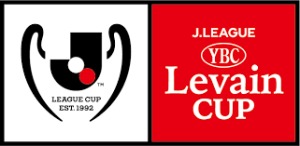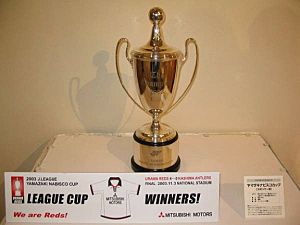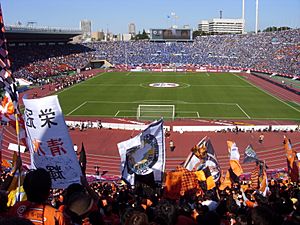J.League Cup facts for kids
 |
|
| Founded | 1992 |
|---|---|
| Region | Japan |
| Number of teams | 60 |
| Current champions | Nagoya Grampus (2nd title) |
| Most successful club(s) | Kashima Antlers (6 titles) |
| Television broadcasters | Fuji TV, SKY PerfecTV! (live matches) |
The J.League Cup is a major football (soccer) tournament for professional men's teams in Japan. It's organized by the J.League, Japan's top football league. Think of it as Japan's version of a league cup, similar to the Football League Cup in England.
Since it started in 1992, the competition has been sponsored by the food company Yamazaki Biscuits (YBC). Because of this, it's officially called the J.League YBC Levain Cup. "Levain" is a popular brand of crackers made by YBC. Before 2016, it was known as the J.League Yamazaki Nabisco Cup, or just the Nabisco Cup.
The tournament's format, or how it's structured, changes often. This is usually to fit around big international events like the Olympic Games or the World Cup.
Contents
How the Tournament Works
The way the J.League Cup is played has changed many times over the years. The goal is always to find the single best team through a series of exciting matches.
Early Years (1992–1998)
When the cup started in 1992, only the first ten J.League clubs played. They first played in a group, and the best teams moved on to a knockout stage. In a knockout match, the loser is out of the tournament.
Over the next few years, more teams joined as the league grew. The format sometimes used only knockout rounds and sometimes started with a group stage.
Including More Clubs (1999–2017)
For a few years starting in 1999, clubs from both the top division (J1) and the second division (J2) of Japanese football took part. This made the tournament bigger and more competitive.
From 2002 to 2017, the cup was mostly for J1 teams only. Often, the top teams that were playing in the AFC Champions League (Asia's biggest club tournament) would get to skip the early rounds. The other teams would play in groups to decide who would advance to the knockout stage.
Modern Era (2018–Present)
Starting in 2018, the tournament opened up again to include teams from both J1 and J2. This gave more clubs a chance to compete for the trophy.
A big change happened in 2024. For the first time, all 60 clubs from Japan's top three professional leagues (J1, J2, and J3) were included. The tournament is now a massive knockout competition. The very best teams, who also play in the AFC Champions League, get a "bye," meaning they join the tournament at a later stage. The other 57 clubs battle it out in single-elimination games until only a few remain to challenge the top seeds.
Prizes and Trophy
Winning the J.League Cup is a huge achievement, and it comes with great rewards.
- Champions: The winning team receives the J.League Cup trophy, the YBC Levain Cup trophy, gold medals, and 150 million yen (about 1 million US dollars).
- Runners-up: The second-place team gets a special plaque, silver medals, and 50 million yen.
- Third place: The two teams that lose in the semi-finals each receive a plaque and 20 million yen.
The beautiful silver trophy was made by the famous American luxury company Tiffany & Co.. It is about 56 cm tall and has a soccer ball at the very top.
List of Finals
Here is a list of every final match in the J.League Cup's history. Some finals were decided by a penalty shootout (pso) after the game ended in a tie.
| Year | Winners | Score | Runners-up | Venue | Attendance |
|---|---|---|---|---|---|
| 1992 | Verdy Kawasaki | 1–0 | Shimizu S-Pulse | National Stadium | 56,000 |
| 1993 | Verdy Kawasaki | 2–1 | Shimizu S-Pulse | National Stadium | 53,677 |
| 1994 | Verdy Kawasaki | 2–0 | Júbilo Iwata | Kobe Universiade Memorial Stadium | 37,475 |
| 1995 | Not played | ||||
| 1996 | Shimizu S-Pulse | 3–3 (aet) (5–4 p) |
Verdy Kawasaki | National Stadium | 28,232 |
| 1997 | Kashima Antlers | 7–2 agg. 2–1 5–1 |
Júbilo Iwata | First leg: Yamaha Stadium Second leg: Kashima Soccer Stadium |
First leg: 10,437 Second leg: 14,444 |
| 1998 | Júbilo Iwata | 4–0 | JEF United Ichihara | National Stadium | 41,718 |
| 1999 | Kashiwa Reysol | 2–2 (aet) (5–4 p) |
Kashima Antlers | National Stadium | 35,238 |
| 2000 | Kashima Antlers | 2–0 | Kawasaki Frontale | National Stadium | 26,992 |
| 2001 | Yokohama F. Marinos | 0–0 (aet) (3–1 p) |
Júbilo Iwata | National Stadium | 31,019 |
| 2002 | Kashima Antlers | 1–0 | Urawa Red Diamonds | National Stadium | 56,064 |
| 2003 | Urawa Red Diamonds | 4–0 | Kashima Antlers | National Stadium | 51,758 |
| 2004 | FC Tokyo | 0–0 (aet) (4–2 p) |
Urawa Red Diamonds | National Stadium | 53,236 |
| 2005 | JEF United Chiba | 0–0 (aet) (5–4 p) |
Gamba Osaka | National Stadium | 45,039 |
| 2006 | JEF United Chiba | 2–0 | Kashima Antlers | National Stadium | 44,704 |
| 2007 | Gamba Osaka | 1–0 | Kawasaki Frontale | National Stadium | 41,569 |
| 2008 | Oita Trinita | 2–0 | Shimizu S-Pulse | National Stadium | 44,723 |
| 2009 | FC Tokyo | 2–0 | Kawasaki Frontale | National Stadium | 44,308 |
| 2010 | Júbilo Iwata | 5–3 (aet) | Sanfrecce Hiroshima | National Stadium | 39,767 |
| 2011 | Kashima Antlers | 1–0 (aet) | Urawa Red Diamonds | National Stadium | 46,599 |
| 2012 | Kashima Antlers | 2–1 (aet) | Shimizu S-Pulse | National Stadium | 45,228 |
| 2013 | Kashiwa Reysol | 1–0 | Urawa Red Diamonds | National Stadium | 46,675 |
| 2014 | Gamba Osaka | 3–2 | Sanfrecce Hiroshima | Saitama Stadium 2002 | 38,126 |
| 2015 | Kashima Antlers | 3–0 | Gamba Osaka | Saitama Stadium 2002 | 50,828 |
| 2016 | Urawa Red Diamonds | 1–1 (aet) (5–4 p) |
Gamba Osaka | Saitama Stadium 2002 | 51,248 |
| 2017 | Cerezo Osaka | 2–0 | Kawasaki Frontale | Saitama Stadium 2002 | 53,452 |
| 2018 | Shonan Bellmare | 1–0 | Yokohama F. Marinos | Saitama Stadium 2002 | 44,242 |
| 2019 | Kawasaki Frontale | 3–3 (aet) (5–4 p) |
Hokkaido Consadole Sapporo | Saitama Stadium 2002 | 48,119 |
| 2020 | FC Tokyo | 2–1 | Kashiwa Reysol | National Stadium | 24,219 |
| 2021 | Nagoya Grampus | 2–0 | Cerezo Osaka | Saitama Stadium 2002 | 17,933 |
| 2022 | Sanfrecce Hiroshima | 2–1 | Cerezo Osaka | National Stadium | 39,608 |
| 2023 | Avispa Fukuoka | 2–1 | Urawa Red Diamonds | National Stadium | 61,683 |
| 2024 | Nagoya Grampus | 3–3 (aet) (5–4 p) |
Albirex Niigata | National Stadium | 62,517 |
Most Successful Clubs
This table shows which clubs have won the J.League Cup the most times.
| Club | Winners | Runners-up | Winning seasons | Runners-up seasons |
|---|---|---|---|---|
| Kashima Antlers |
|
|
1997, 2000, 2002, 2011, 2012, 2015 | 1999, 2003, 2006 |
| Tokyo Verdy |
|
|
1992, 1993, 1994 | 1996 |
| FC Tokyo |
|
|
2004, 2009, 2020 | |
| Urawa Red Diamonds |
|
|
2003, 2016 | 2002, 2004, 2011, 2013, 2023 |
| Júbilo Iwata |
|
|
1998, 2010 | 1994, 1997, 2001 |
| Gamba Osaka |
|
|
2007, 2014 | 2005, 2015, 2016 |
| JEF United Chiba |
|
|
2005, 2006 | 1998 |
| Kashiwa Reysol |
|
|
1999, 2013 | 2020 |
| Nagoya Grampus |
|
|
2021, 2024 | |
| Shimizu S-Pulse |
|
|
1996 | 1992, 1993, 2008, 2012 |
| Kawasaki Frontale |
|
|
2019 | 2000, 2007, 2009, 2017 |
| Cerezo Osaka |
|
|
2017 | 2021, 2022 |
| Sanfrecce Hiroshima |
|
|
2022 | 2010, 2014 |
| Yokohama F. Marinos |
|
|
2001 | 2018 |
| Oita Trinita |
|
|
2008 | |
| Shonan Bellmare |
|
|
2018 | |
| Avispa Fukuoka |
|
|
2023 | |
| Hokkaido Consadole Sapporo |
|
|
2019 | |
| Albirex Niigata |
|
|
2024 |
Player Awards
At the end of each tournament, special awards are given to the best players.
Most Valuable Player (MVP)
The MVP award is given to the best overall player of the tournament.
New Hero Award
This award is for the best young player (under age 23) in the tournament. Football journalists vote to decide the winner.
How to Watch
In Japan, all the matches are shown on TV by Fuji TV and SKY PerfecTV!.
For fans outside of Japan, many of the later-stage matches are streamed live on the official J.League International channel on YouTube.
See also
 In Spanish: Copa J. League para niños
In Spanish: Copa J. League para niños
- Sport in Japan
- Football in Japan
- Japan Football Association (JFA)
 | Georgia Louise Harris Brown |
 | Julian Abele |
 | Norma Merrick Sklarek |
 | William Sidney Pittman |



